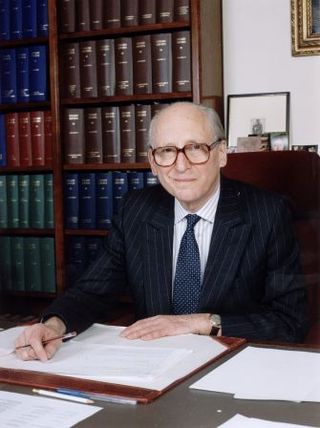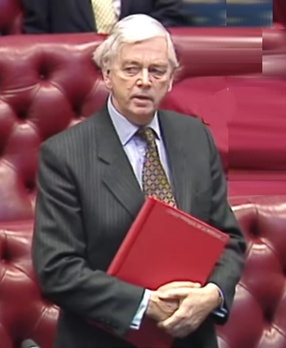In criminal and civil law, strict liability is a standard of liability under which a person is legally responsible for the consequences flowing from an activity even in the absence of fault or criminal intent on the part of the defendant.

In legal usage in the English-speaking world, an act of God is a natural hazard outside human control, such as an earthquake or tsunami, for which no person can be held responsible. An act of God may amount to an exception to liability in contracts or it may be an "insured peril" in an insurance policy. In Scots law the equivalent term is damnum fatale.

Thomas Henry Bingham, Baron Bingham of Cornhill,, was an eminent British judge who was successively Master of the Rolls, Lord Chief Justice and Senior Law Lord. He was described as the greatest lawyer of his generation. Baroness Hale of Richmond observed that his pioneering role in the formation of the United Kingdom Supreme Court may be his most important and long-lasting legacy. Lord Phillips of Worth Matravers regarded Bingham as "one of the two great legal figures of my lifetime in the law". David Hope, Baron Hope of Craighead described Bingham as "the greatest jurist of our time".
Nuisance is a common law tort. It means something which causes offence, annoyance, trouble or injury. A nuisance can be either public or private. A public nuisance was defined by English scholar Sir James Fitzjames Stephen as,
"an act not warranted by law, or an omission to discharge a legal duty, which act or omission obstructs or causes inconvenience or damage to the public in the exercise of rights common to all Her Majesty's subjects".

English tort law concerns the compensation for harm to people's rights to health and safety, a clean environment, property, their economic interests, or their reputations. A "tort" is a wrong in civil, rather than criminal law, that usually requires a payment of money to make up for damage that is caused. Alongside contracts and unjust enrichment, tort law is usually seen as forming one of the three main pillars of the law of obligations.

Rylands v Fletcher (1868) LR 3 HL 330 is a leading decision by the House of Lords which established a new area of English tort law. It established the rule that one's non-natural use of their land, which leads to another's land being damaged as a result of dangerous things emanating from the land, is strictly liable.

Donald James Nicholls, Baron Nicholls of Birkenhead, was a British barrister who became a Law Lord.
Brinnington is a north-eastern suburb of Stockport, Greater Manchester, England, on a bluff above a bend in the Tame Valley between the M60 motorway and Reddish Vale Country Park.
Absolute liability is a standard of legal liability found in tort and criminal law of various legal jurisdictions.

Leonard Hubert "Lennie" Hoffmann, Baron Hoffmann is a retired senior South African–British judge. He served as a Lord of Appeal in Ordinary from 1995 to 2009.
In English law, remoteness between a cause of action and the loss or damage sustained as a result is addressed through a set of rules in both tort and contract, which limit the amount of compensatory damages available for a wrong.
Vis major is a greater or superior force; an irresistible force. It may be a loss that results immediately from a natural cause that could not have been prevented by the exercise of prudence, diligence and care. It is also termed as vis divina or superior force.

United Kingdom administrative law is part of UK constitutional law that is designed through judicial review to hold executive power and public bodies accountable under the law. A person can apply to the High Court to challenge a public body's decision if they have a "sufficient interest", within three months of the grounds of the cause of action becoming known. By contrast, claims against public bodies in tort or contract are usually limited by the Limitation Act 1980 to a period of 6 years.

Burnie Port Authority v General Jones Pty Ltd is a tort law case from the High Court of Australia, which decided it would abolish the rule in Rylands v Fletcher, and the ignis suus principle, incorporating them generally into the tort of negligence.
Vicarious liability in English law is a doctrine of English tort law that imposes strict liability on employers for the wrongdoings of their employees. Generally, an employer will be held liable for any tort committed while an employee is conducting their duties. This liability has expanded in recent years following the decision in Lister v Hesley Hall Ltd to better cover intentional torts, such as sexual assault and deceit. Historically, it was held that most intentional wrongdoings were not in the course of ordinary employment, but recent case law suggests that where an action is closely connected with an employee's duties, an employer can be found vicariously liable. The leading case is now the Supreme Court decision in Catholic Child Welfare Society v Institute of the Brothers of the Christian Schools, which emphasised the concept of "enterprise risk".

Cambridge Water Co Ltd v Eastern Counties Leather plc [1994] 1 All ER 53 is a case in English tort law that established the principle that claims under nuisance and Rylands v Fletcher must include a requirement that the damage be foreseeable; it also suggested that Rylands was a sub-set of nuisance rather than an independent tort, a debate eventually laid to rest in Transco plc v Stockport Metropolitan Borough Council.
In 2001, an area of residential land in Bawtry, South Yorkshire, England was found to contain hazardous by-products from the manufacture of coal gas. Under the Environmental Protection Act 1990, decontamination was held to be the responsibility of National Grid Gas (NGG), even though the negligence may have dated back before the 1948 nationalisation.

Tort law in India is primarily governed by judicial precedent as in other common law jurisdictions, supplemented by statutes governing damages, civil procedure, and codifying common law torts. As in other common law jurisdictions, a tort is breach of a non-contractual duty which has caused damage to the plaintiff giving rise to a civil cause of action and for which remedy is available. If a remedy does not exist, a tort has not been committed since the rationale of tort law is to provide a remedy to the person who has been wronged.
Cattle trespass was an ancient common law tort whereby the keeper of livestock was held strictly liable for any damage caused by the straying livestock. Under English law the tort was abolished by section 1(1)(c) of the Animals Act 1971, but the tort continues to subsist in other common law jurisdictions, either in its original form as a common law tort, or as modified by statute.